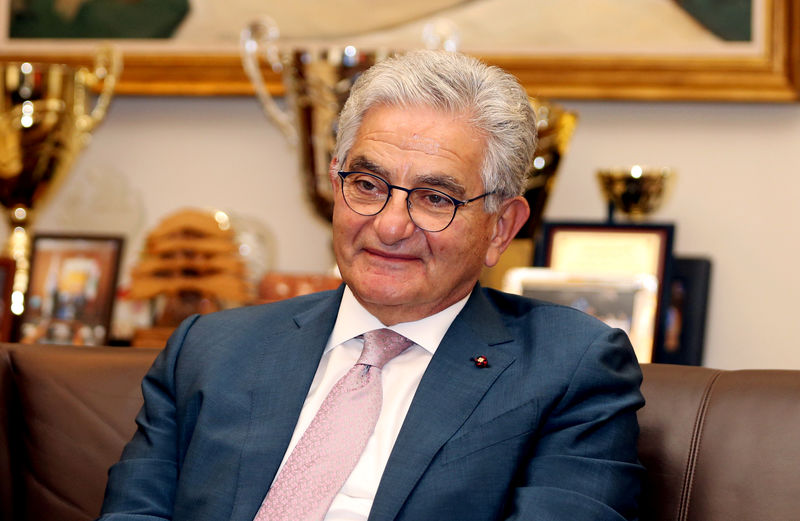By Tom Perry
BEIRUT (Reuters) - Lebanese banks are liquid but operating in a very strong "wave of uncertainty", the banking association head said, describing temporary controls introduced this week as "a fence to protect the system" until the situation normalizes.
Salim Sfeir dismissed the suggestion of a haircut on bank deposits, mooted by some observers in the financial industry, as "insane", telling Reuters it would badly hurt the future stability of a country dependent on capital inflows.
He said he was being told depositors were already estimated to have withdrawn $3 billion or more and put the cash at home in the last six months.
He said a central bank request for banks to raise their capital by 10% by the end of 2019 was also unrealistic unless a new government was formed and a more positive climate emerged. "If the situation stays as it is, it is not realistic," he said.
Facing the worst economic crisis since its 1975-90 civil war, Lebanon has slid even deeper into trouble since the eruption of protests against the ruling elite last month.
The protests have ignited a major political crisis, leading to the resignation of Prime Minister Saad al-Hariri and deadlock over what kind of government should take office.
Lebanese banks have been shut for the most of time since the protests began. They reopened on Tuesday from a second period of closure after agreeing temporary controls which include a $1,000 weekly cap on withdrawals from U.S. dollar accounts and restricting transfers abroad to urgent personal spending.
"In view of the political situation, you need a certain fence to protect the system itself until the situation comes back to normal," Sfeir said.
"The positivity of these controls is that it should motivate our politicians to make a wise decision and come up with a political equation that satisfies the (people on the) ground," he said. "It should also alleviate the pressure towards the withdrawal of deposits that are being placed at home."
DEBT BURDEN
Sfeir said the banks were liquid but "the wave of uncertainty is very strong". "I have never seen as many people in our banks as we have seen lately," he said.
The economic crisis is rooted in years of state waste and corruption that have landed Lebanon with one of the world's heaviest public debt burdens.
It has been compounded by diminished inflows of capital upon which Lebanon depends to finance the budget and current account deficits. The Lebanese pound has weakened below its official rate.
The Institute of International Finance has said deposits declined by more than $10 billion since the end of August. Half of this had been withdrawn from the country and the other half was being kept at home.
Since the protests began, Sfeir said inflows to Lebanon had "not stopped but they have weakened certainly".
"What is really hurting is the reaction of people ... It is safer to keep your money in a bank than to keep it at home."
Some investors have suggested that seizing a proportion of bank deposits or a haircut on government bondholders, reducing the value of their asset, may be needed to escape the crisis.
"I don't see how a haircut would solve our situation. Our situation would be solved through political stability," Sfeir said, adding any such decision would need to be taken by government and passed by parliament.
"It will scare everybody. The diaspora - our people have plenty of money overseas. This money will never come back if there is a haircut," he said.
The central bank last week said it was allowing banks to borrow dollars without limits at 20% interest to secure depositors’ needs on condition the funds were not sent abroad.

While the central bank had opened its "vaults" to help in case of a liquidity squeeze, "the interest rate of 20% is an obstacle to take advantage of this situation", Sfeir said.